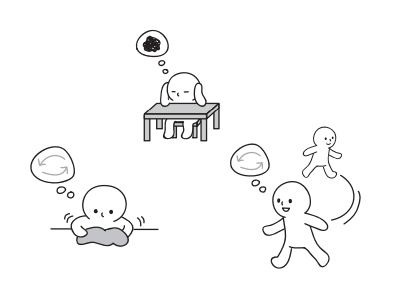Difference between revisions of "Thinking in Action/OG"
Jump to navigation
Jump to search
Creating prototypes or diving into fields deepens your thinking.
***
▼In this context
▼Therefore
Sfrancisco (talk | contribs) (Added source) |
Sfrancisco (talk | contribs) (Added category) |
||
| Line 53: | Line 53: | ||
<references/> | <references/> | ||
[[Category:Design_patterns]] <!-- List of other categories the design pattern belongs to. The syntax for linking to a category is: [[Category:<Name of category]] --> | [[Category:Design_patterns]] [[Category:Full_Pattern]]<!-- List of other categories the design pattern belongs to. The syntax for linking to a category is: [[Category:<Name of category]] --> | ||
Revision as of 13:13, 5 May 2017
| Thinking in Action | |
| Contributors | Takashi Iba, Mami Sakamoto |
|---|---|
| Last modification | May 5, 2017 |
| Source | Iba & Sakamoto (2011)[1]; Iba (2010)[2] |
| Pattern formats | OPR Alexandrian |
| Usability | |
| Learning domain | |
| Stakeholders | |
“The way to get started is to quit talking and begin doing.”— Walt Disney
“The only source of knowledge is experience.” — Albert Einstein
You have been studying by reading books, articles, or other written materials.
It is difficult to get out of the situation when you are stuck.
- • It is not easy to change your understanding without interaction between you and your environment.
- • It is difficult to foresee all of possible challenges before carrying out your plan.
- • Creation and practice make you aware of your limitations.
Deepen your thought process by making prototypes and doing fieldwork.
- • Making prototypes with easily manipulated medium by Prototyping (Prototyping), and you will improve your ideas and gain new insight.
- • Acquire knowledge from doing fieldwork by Field Diving (Field Diving), and the knowledge will help you to deepen your thoughts.
References
- ↑ Iba, T., & Sakamoto, M. (2011). Learning patterns III: a pattern language for creative learning. In Proceedings of the 18th Conference on Pattern Languages of Programs, PLoP 2011 (p. 29). ACM: New York.
- ↑ Patlet mentioned in Iba, T. (2010). Designing a Pattern Language for Creative Learners.
